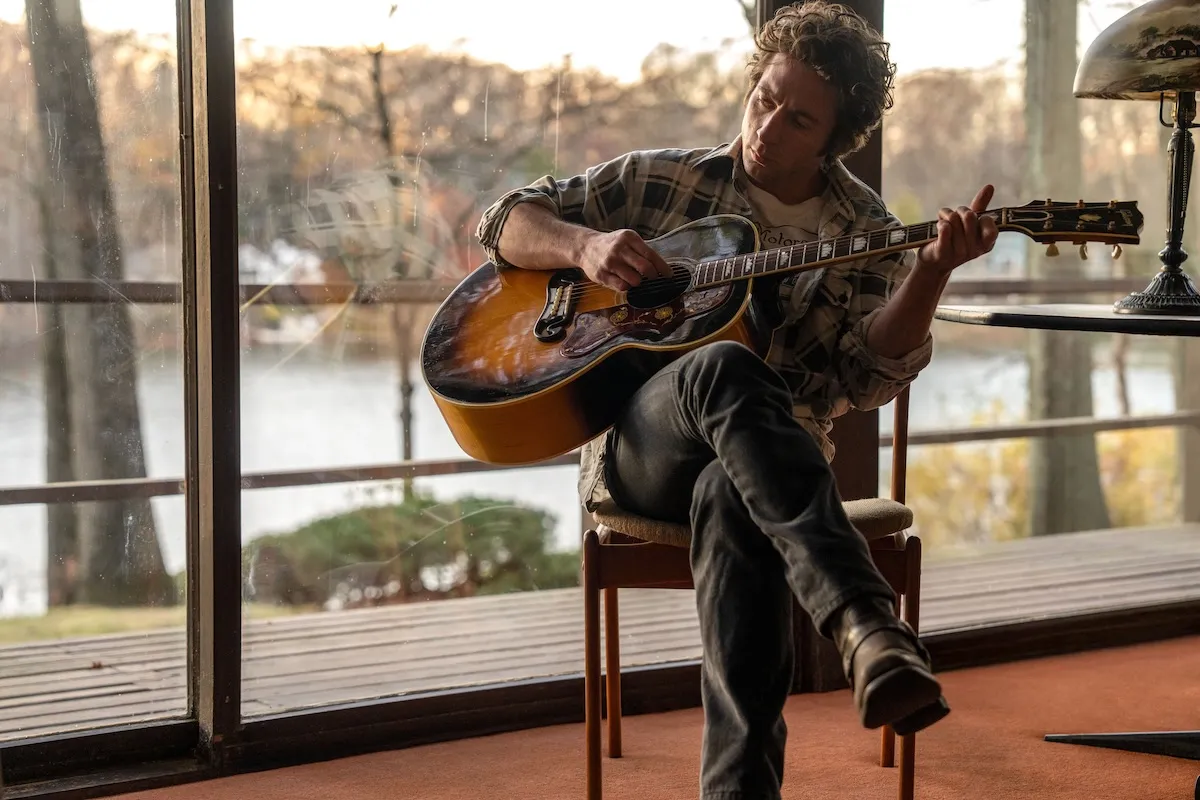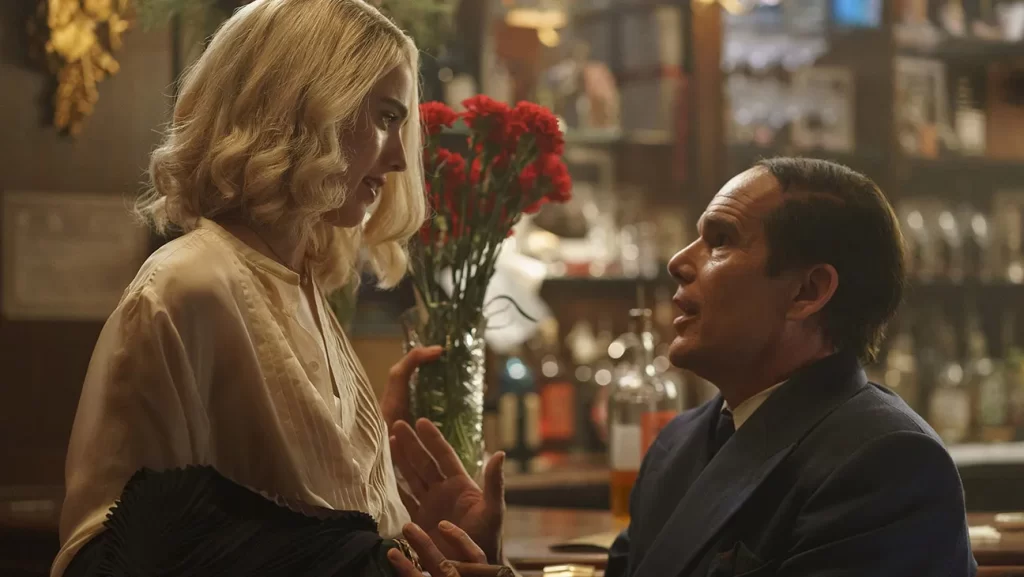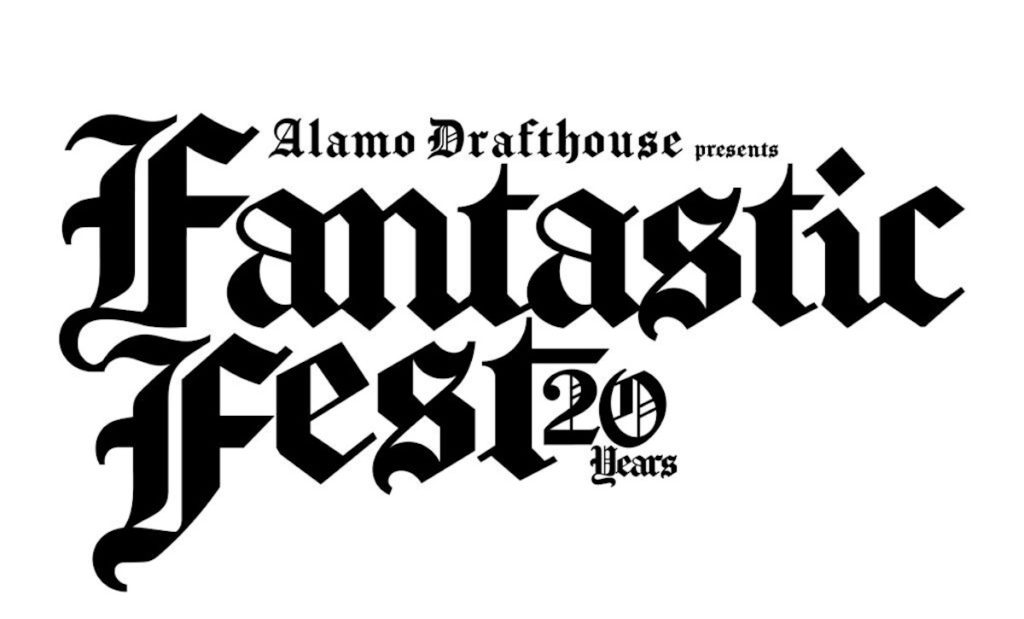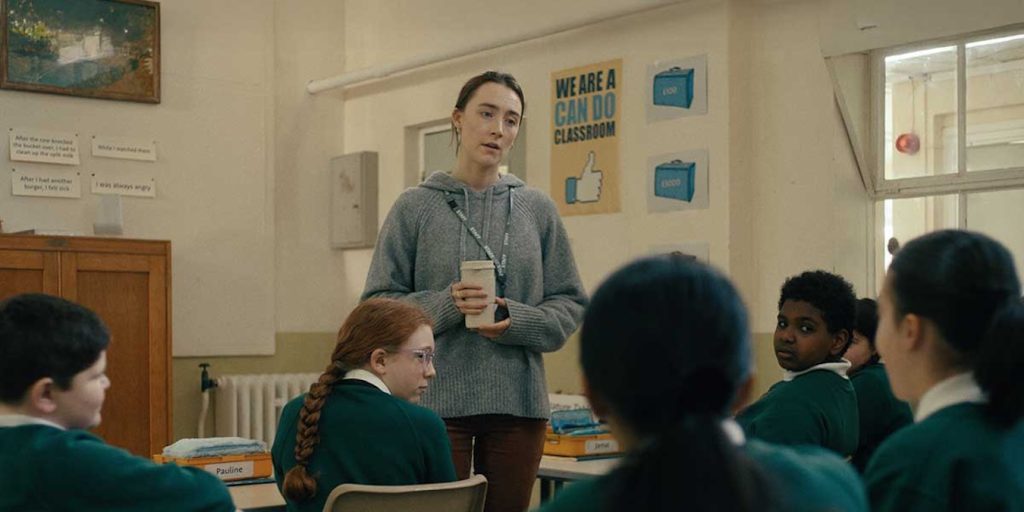I know it sounds like hyperbole to say that I found it personally offensive of the New York Film Festival to not only select Springsteen: Deliver Me From Nowhere, but to make it their Spotlight Gala — as if to say, yes, this, this is what we’re all about. But it makes my skin crawl, because musical biopics like this are the scourge of middlebrow moviemaking at the moment, the rare mid-budget movies that studios are willing to greenlight because they offer the safety valve of a recognizable figure at their center, what amounts to boomer IP.
Actors like movies like Deliver Me from Nowhere because they allow them to play dress-up, to wow Oscar viewers not with the skill of their acting but with the aptitude of their impersonation. (As Jeremy Allen White and the stand-in E Street Band roar through a full performance of “Born in the U.S.A.,” I realized what I was watching was less a movie than an expensive episode of Celebrity Lip-Synch Battle.) Audiences like movies like this because they don’t ask anything of them; they know the story that’s being told, the fans in its specifics and the casuals in the never-shifting arc of the music biopic, they know the songs that are being sung, and they know exactly how they’re going to make them feel. It’s what passes for moviemaking for adults in 2025, simply because the hot star of the moment is dressed up as a rock star rather than a superhero, but the impulse is the same: people who go to the movies for the experience, memorably defined by @dril, as “thinking about shit that i Recognize and smiling.”
Julia Roberts has a Big Speech near the end of After the Hunt that she absolutely refuses to deliver as such, eschewing the acting class theatrics for a flat, matter-of-fact delivery, letting the words do the work. It’s a good example of why her performance is so terrific, and of what’s good about Luca Guadagnino’s latest: it’s a story about cancel culture that refuses the easy cop-outs, and lets everyone be messy. I’m not sure why it still feels like such a subversion when Roberts plays an unlikable, or even merely flawed, character — that’s just a good long stint as America’s Sweetheart, I guess — but it’s exhilarating here, so that it’s not a matter of cheering our heroine on as she rails against trigger warnings or they/them pronouns or whatever. It’s understanding that these are the grievances of a broken person who resents being asked to consider another point-of-view.
Thankfully, Guadagnino and screenwriter Noah Garrett harbor no such resistance, and are willing to see all their characters equally (which means to see them all as messy). Guadagnino indulges his taste for formal experimentation, using unexpected compositions, peculiar framing, zooms that snap a little too fast, and uncomfortably close close-ups, all to keep us off-balance. (Trent Reznor and Atticus Ross’s score is similarly knotty, taking the customary notes and moods and inverting them.) He’s making a social drama in the visual and aural language of a thriller, and it works — up until the unnecessary epilogue, which is becoming the scourge of modern screenwriting.
Due to what could, with some understatement, be classified as circumstances beyond his control, Jafar Panahi’s recent films have worked at a necessary but invigorating intersection of narrative and documentary, always informed by the severe limitations of his ability to make movies while under the thumb of the Iranian government. In his new film, the Palme d’Or winner It Was Just an Accident, he’s finally able to shed that scaffolding entirely and tell a fictional story through an entirely narrative lens — and the result is arguably his finest work to date.
The title has a double-meaning; the story opens with an automobile accident that sets the events into motion, but what follows is a series of such coincidences and impossibilities that it’s entirely possible that everyone has made grave mistakes. It hinges on a question of identity, as mechanic Vahid (Vahid Mobasseri) encounters a man (Ebrahim Azizi) whom he believes is the government agent who tortured him and several acquaintances years earlier. Panahi finds moments of levity even within this dark story (the image of another possible victim, kicking a van and asking where he is while she’s donning nothing more regal than a wedding dress, is a memorable one), but it all culminates in a long, tough scene of confessions and confrontations that contains some of the most gut-wrenching acting of any film in recent memory.
The early “Reporting by Seymour Hirsch” credit in Laura Poitras and Mark Obenhaus’s Cover-Up is an early indication that this is no ordinary bio-doc. Though his colorful background gets a modicum of screen time, the filmmakers are less interested in the particulars of Hirsh the person (we’re 90 minutes in before he he talks at any length about his wife of decades) than Hirsh the reporter, how he did the job and what drove him to do it; an early stretch, detailing each step of how he reported out his breakthrough story on the My Lai Massacre, is as exciting as any political thriller.
But the filmmakers let it get sticky in the second half, and he gets crustier and more combative as they get into some of the less triumphant moments of his late career. (“In case anybody cares, this is less and less fun,” he snorts.) But there’s no denying the power of his work, and the significant stories he covered and, in many cases, shaped. And its closing passages, while abrupt upon first viewing, deepen as one considers the lingering but unasked question: does any of this work even matter?
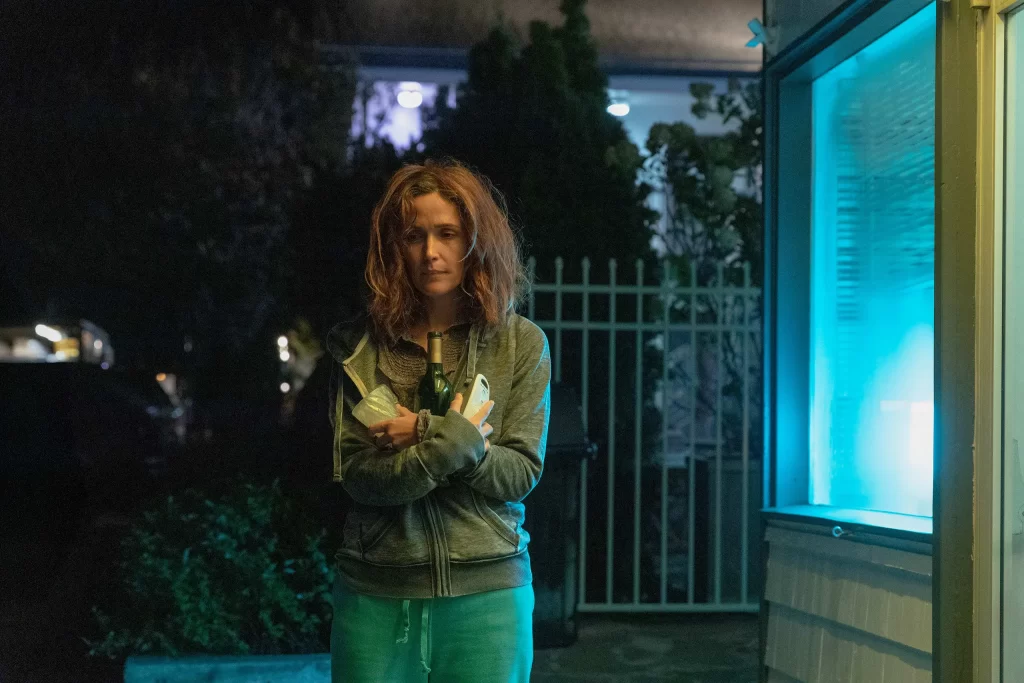
Hey, we have the same baby monitor, I thought to myself near the beginning of If I Had Legs I’d Kick You, and suffice it to say it was not the last moment of personal identification within its 113 minutes. I’m not sure I’ve ever seen a film so vividly capture the moment-to-moment feeling of living with anxiety (and living around people with it) — which makes it a nerve-rattling, sometimes harrowing sit. But it’s putting a real state of being on screen, anchored by a jaw-dropping performance by Rose Byrne; writer/director Mary Bronstein opens with a close-up of Byrne’s face, listening, stressed, already fuming, and as she listens, flinches, and reacts, it pushes in closer, and closer, and somehow closer still. And that’s a pretty apt visual representation of the entire movie.
The emotional and psychological intensity are matched by the flashes of nightmare imagery, all of our senses assaulted by the trials and tribulations of this woman who is doing what so many do, every single day: caring for her sick kid, being a single parent (her military husband is perpetually out of town), working, and trying to keep her sanity. I overheard people on the way out complaining that it was too relentless, too one-note, which is not entirely true; one of Bronstein’s gifts is her ability to capture those milliseconds of silence, the fleeting oases of calm within the storm, before a scream of “MOMMY” jars her back to reality. It’s a tremendous picture, if you’ve got the constitution for it.
Argentinian director Milagros Mumenthaler’s The Currents throws you into similar territory — somewhat literally, as it opens with heroine Lina (Isabel Aimé González Sola) receiving a professional award, quietly throwing it in a bathroom trash can, taking a walk, and hurling herself off a bridge into the freezing water below. It’s a bracing opening, because it’s so unexpected and, for some time, unexplained; it buys Mumenthaler some time, because in the scenes that follow, we’re watching her live a seemingly normal life while fully aware of what’s churning inside her.
“Should we talk about how weird you’re acting?” asks her husband, and he’s not wrong; she’s suddenly prone to panic attacks and flight-of-fancy daydreams, and is inconveniently afraid of water. She’s trying “not to feel so ephemeral,” she explains, and truly, whom among us cannot relate? Sola masterfully makes irresponsible behavior sympathetic, while Mumenthaler, like Bronstein, displays a clear gift for putting us into her protagonist’s unsteady shoes.
Anomone is Daniel Day-Lewis’s first film appearance in eight years, after starring in Phantom Thread and then retiring, presumably (and sensibly) believing that it wasn’t going to get any better than that. It doesn’t here, but he had other motives; Anomone is the feature directorial debut of his son, Ronan Day-Lewis, and they wrote the script together. It feels like the kind of role an actor would write to rouse himself out of retirement: lots of long, searching monologues, non-verbal stewing, and enigmatic self-awareness.
He’s terrific, to be clear — it’s just that there’s not much else happening. Sean Bean and Samantha Morton don’t have enough to do in their supporting roles, and though the younger Day-Lewis can move the camera well, the deliberate pacing and the slow drip of exposition will drive less patient viewers mad. Anomone isn’t a waste, exactly, but I hope it re-lit the fires for Daniel Day-Lewis enough that we’ll see more work yet, perhaps with a fine filmmaker he’s not related to.

Father Mother Sister Brother comes to New York fresh from its triumph at the Venice Film Festival, where it won writer/director Jim Jarmusch the Golden Lion, and it’s frankly a little puzzling to give him such a major award for such a minor work. It’s a triptych, along the lines of his Mystery Train, and maybe that’s a miscalculation; one shouldn’t make it so easy to compare a new movie to a previous masterpiece, especially when it comes up this short. Its vibes are immaculate (any movie that both opens and closes with “Spooky” cannot help it), and Jarmusch and his big-name cast spin what tension and drama they can out of what amounts to a collection of uncomfortable silences and strained small talk.
There’s no real thread, narratively speaking; he gives us three family reunions, which are connected less by what happens than a series of shared objects, phrases, and peripheral parties. These are people whose conversations are less defined by what they say than what they don’t, and what we can infer from that subtext. Individual moments work, and some of the performances are memorable. But it ultimately doesn’t add up to much.
Any documentary filmmaker is really making a movie about two things, their subjects and themselves, and finding the balance between them can be the hardest part of the job. Ben Stiller doesn’t quite find that balance in Stiller & Meara: Nothing is Lost, and it couldn’t have been an easy job; early on, he indicates that he embarked on the project partly to understand his own life and difficulties by analyzing those of his parents, a successful comedy team who became respected, successful character actors.
He had truckloads of material to draw from — his father recorded everything and kept everything — so maybe that’s why it seems like such a distraction when he spins off into searching conversations with his wife and kids. It’s not that those sections aren’t of interest, and they certainly seem therapeutic. But the archival material, both from their public appearances and of their private interactions, is so rich, and the ups-and-downs of their careers are so fascinating, that I kept waiting impatiently for the younger Stiller to get back to the people in the title of his movie.
